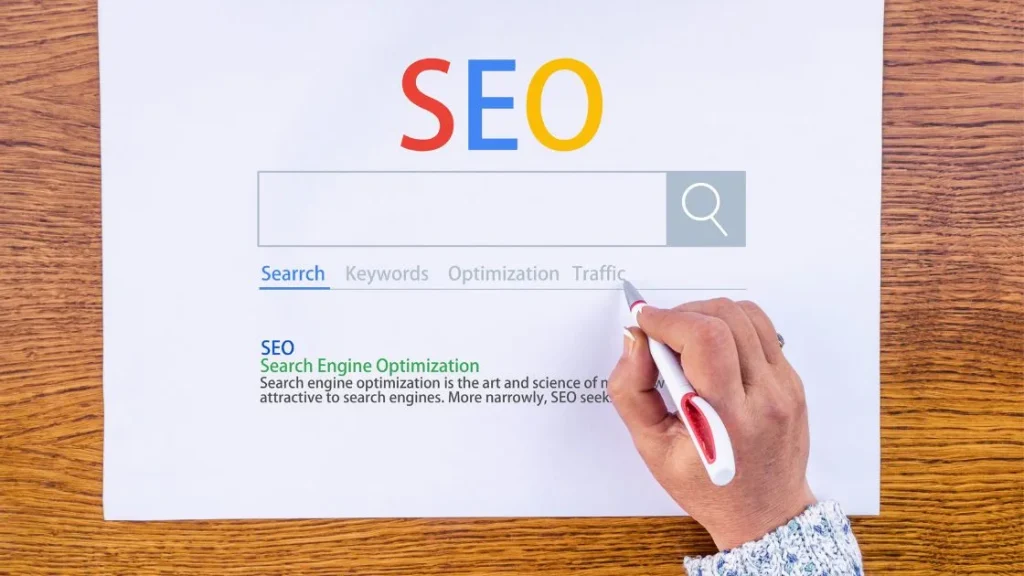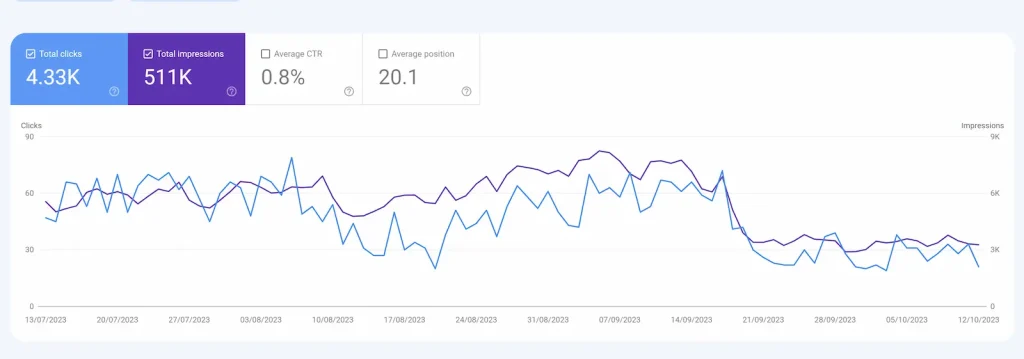Key Takeaways
- An SEO manager is responsible for planning and executing an effective search engine optimization strategy for a brand and its website.
- To be successful in the SEO world, you need to have hard skills in both technical and non-technical content writing.
- Social and business etiquette are two essential SEO skills that every SEO manager should understand and practice.
If you’re looking to take your SEO career to new heights, you’ll need to learn some essential soft skills. Being a great SEO goes beyond mere technical SEO.
In this blog post, we’ll outline the seven most important soft skills for SEO managers and provide tips on how to develop them. We’ll also discuss the importance of these skills in the SEO world and how they can help you achieve your goals.
So, whether you’re a beginner or an experienced SEO specialist; soft skills might just be what you need to up your SEO game and start seeing better results in your content marketing game. Like Peggy Klaus said:
Soft skills get little respect, but will make or break your career."
Peggy Klaus
What Does an SEO Manager Actually Do?

If you have some idea of what an SEO manager would be responsible for then you probably already know the basics surrounding SEO as a career. An SEO manager is responsible for planning and executing an effective search engine optimization strategy for a brand and its website. You won’t be surprised to learn that this includes developing and implementing tactics that will improve overall traffic and visibility on search engines.
The role of an SEO manager has exploded in recent years as more people turn to online sources for information. As a result, businesses that do not have an effective SEO strategy may find themselves at a disadvantage compared to their competitors. So as an SEO manager, you will have an important role in growing your customer’s business and how it’s represented in online searches.
So, what skills does an ideal SEO candidate possess?
Ideally, they should have experience with digital marketing concepts such as keyword research, lead generation, landing page design, link-building techniques, social media management, SEM (Search Engine Marketing, PPC (pay-per-click,) targeting techniques, and finally, analytics.
In addition to these general web marketing skills, they should also be knowledgeable about search engine algorithms (such as Panda/Penguin), as well as Google search console. They should also be familiar with current industry trends so they can keep up with changes in the market. Finally, they must be able to work independently and take care of their own deadlines while maintaining communication with team members throughout the process.
If you are looking for an opportunity to develop your web marketing skills while helping grow a business, then consider becoming an SEO manager. There are many rewarding opportunities out there!
What are Soft Skills?

These skills are essential in any field, but they’re especially important in SEO management. Soft skills enable you to interact effectively with other people and manage relationships. They also help you think on your feet, analyse and understand complex information quickly, and come up with creative solutions to problems. In short, they are the foundation of effective decision-making.
Their importance in SEO management is clear when you consider that successful search engine optimization requires a delicate balance. It swings between producing high-quality content and building positive relationships with website owners and target audience members. If you lack the ability to build trust and rapport with others, it will be nearly impossible to achieve success as an SEO manager.
So why learn about soft skills? Because they’re crucial not just in SEO management, but in any field where interpersonal interaction is necessary – from marketing strategy development to customer service work! By understanding how skill training can improve your overall career prospects, whether as an individual or within an in-house team setting, you’ll be well on your way towards becoming an SEO expert at what matters most: making great decisions!
Mandatory SEO Soft Skills
To be successful in the SEO world, you need to have hard skills in both technical and non-technical content writing. You also need to be confident and professional when interacting with clients or other stakeholders. Here are some mandatory top skills that will help you achieve success in your SEO marketing efforts:
1 – Effective Priority Management
Another factor in low search engine rankings may be Google not indexing your website. So why would this happen? It’s all about making it easy for your visitors to navigate your website with ease of use.
Effective priority management is an important skill for any digital marketing marketer, regardless of their role. And, as SEOs are no exception, effective priority management can help us achieve our goals more efficiently and effectively.
When managing our time and resources, it’s important to first consider our objectives. What do we need to accomplish to meet those objectives? Once we’ve determined this, we should create a prioritized list of tasks that falls under that objective. We should then determine the extent of each task – how much effort will be required and when is the best time to start working on it. Finally, we must make sure that everyone involved with the project understands these priorities and agrees to work within them. Failure to follow these guidelines can lead to frustration among team members and wasted time (and money!).
So, what can SEOs do in order not only to manage their work but also to facilitate effective priority management throughout an organization? Here are a few tips:
- Define company objectives clearly before beginning any project. This will help you determine which tasks fall under which goal(s).
- Assign specific deadlines for each task based on its relative importance (high-value tasks should have shorter deadlines than low-value tasks). keep track of progress regularly so that you know whether or not your assigned deadline has been met!
- Communicate deadlines openly and frequently throughout the entire organization – both verbal & written communication is key here! Keep everyone up-to-date.
2 – Critical Thinking

Critical thinking is an essential skill for any marketing manager, and it’s especially important in SEO management. To be successful with online marketing, you need to be able to think critically and problem-solve. This is how you find solutions to problems that may arise during your campaign execution or optimization efforts.
Being able to think critically means being able to analyze data objectively and draw reasonable conclusions from it. It also grants the ability to look at a situation from multiple perspectives, weigh the pros and cons of each option, and make a decision based on what’s best for your business.
Critical thinking skills can help you make better decisions when trying to optimize your website through google analytics, choose keywords wisely, identify potential competition, or target key markets. By using critical thinking techniques throughout all phases of your SEO strategy, you’ll be better positioned to succeed in today’s competitive industry.
3 – Communication
Poor communication can be the undoing of any SEO campaign. If you’re not able to effectively relay your messages to your team and clients, then you’ll likely struggle to achieve your goals.
Here are a few tips for improving your communication skills:
- Set clear expectations from the beginning. Make sure everyone understands what is expected of them, and be specific about how each task will help advance the overall goal of the campaign.
- Be respectful and concise when speaking with others. Avoid long monologues or speeches, and keep all conversations factual and relevant to the topic at hand.
- Practice active listening; take time to understand what someone is saying before replying thoughtfully. This will allow you to better empathize with them and convey empathy in your words as well).
- Use effective verbal techniques whenever possible; use words that inspire trust, respect, and understanding. This will encourage others to share information openly with you – which is crucial for a successful SEO campaign!
Finally, good communication always flows from positive attitudes and relationships between individuals involved in an organization. When everyone feels respected and valued, they are more likely to cooperate for mutual benefit. So start by building these positive interactions now!
4 – Ability to Learn
You will need to learn from your mistakes through trial and error. As the industry is constantly innovating on new marketing methods and ways to incorporate SEO tactics to increase visibility you will need to learn about the latest innovations.
As Google changes its algorithms or updates its guidelines, your team must be up-to-date on the latest trends and best practices in search engine optimization (SEO). If you’re unable to keep up with current trends, then you’ll be at a major disadvantage when competing for top rankings.
One way to ensure that your team stays informed and able to adapt quickly is by implementing continuous training programs. This will allow everyone on your staff to have access to the latest information, so they can continue performing at their best and help your business reach new heights in online visibility.
5. Understanding the User

User understanding starts with understanding your target audience. What are their needs? What do they care about? Once you have a solid understanding of who your users are, you can begin to develop content that meets their needs. This means writing about topics that interest them, providing useful information and advice, and linking back to relevant pages on your website.
Next, it’s important to understand how users browse online. Do they jump right into the first page results? Or do they scroll down until they find what they’re looking for? Understanding how people navigate through websites is vital when creating effective SEO tactics- if you know where people are clicking on the web, then you can more easily target your marketing efforts towards those areas!
Finally, remember that not all visitors will behave equally when searching for information online. Some might be more sceptical than others; some may prefer detailed explanations over straight facts; and some may be willing to try new things before making a decision. Take these factors into account when developing or editing content so that everyone who visits your site feels like he or she has an equal opportunity to learn something new!
6- Flexibility and Adaptiveness
In today’s competitive digital landscape, any business needs to have a flexible and adaptive approach to SEO management. This means being able to quickly adjust your strategy as new information emerges and changes in the marketplace.
If you aren’t prepared to make quick adjustments on an ongoing basis, you will eventually be at a disadvantage when compared to your competitors. While many factors can influence search engine rankings (such as website content, backlinks, etc.), continual flexibility is key in ensuring that you stay one step ahead of the competition.
It’s clear that being flexible and having adaptive skills are essential for any business looking to remain competitive in an ever-changing digital marketplace. By understanding and employing these principles in your SEO management strategies, you’ll be well on your way toward ensuring self-driven increased traffic and profits!
7 – Social and Business Etiquette

Social and business etiquette are two essential SEO skills that every SEO manager should understand and practice. They can help you build better relationships with your clients, co-workers, and other business partners. And, of course, they can also improve your search engine ranking performance.
Here are a few tips on how to get started:
- Make sure you’re always polite when speaking or contacting people in your industry. This will show them that you respect their time and work ethic, which will make working together easier.
- Try to be upbeat when dealing with others; this will put everyone at ease (including the search engines!).
- Don’t micro-manage or try to control others; allow them the freedom to operate within the boundaries of acceptable behaviour set by you (and/or Google). That way, they’ll trust you more – which is essential if you want them to share confidential information with you!
8 – Empathy
Empathy is a skill that allows you to truly understand your clients and their needs. When you have empathy for your clients, it makes it much easier to identify and solve their problems. This in turn will help you achieve better results on your website.
Here are three ways that having empathy can improve your SEO work:
- When you empathize with your clients, they feel understood and appreciated. This inspires them to be more helpful when working with you, which leads to better results on the site.
- It’s harder for people to argue or disagree when they feel like they’re being heard and understood. This strengthens relationships and helps get conflicts resolved faster – leading to improved online visibility as well as happier customers who return more frequently。
- By understanding how users interact with websites, empathy enables SEO professionals to make informed decisions about site design and content strategy。
SEO Skill Sets You Can't Go Without
Soft skills play an extremely important role in business overall. If you consider how innovative and competitive any online business market is, you will start to understand how important these skills are – to not just handle the competitive nature of the industry but thrive in it.
source https://webjuice.ie/soft-skills-for-seo-managers/

No comments:
Post a Comment